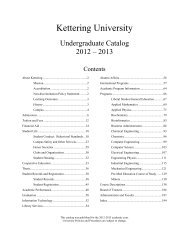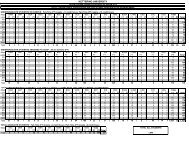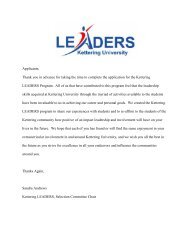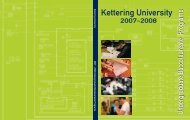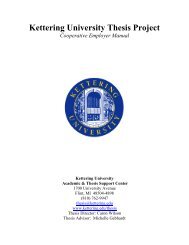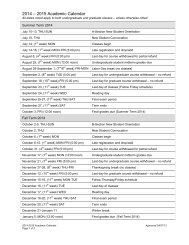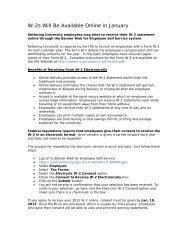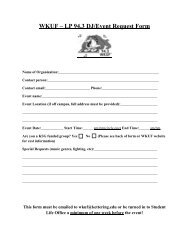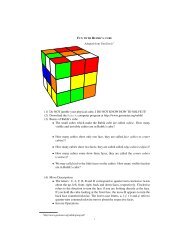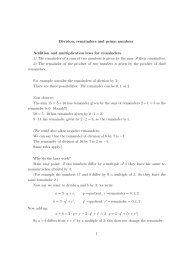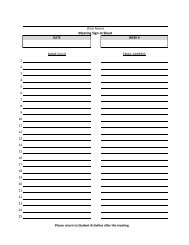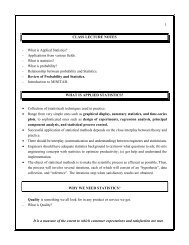2006-2007 Undergraduate Catalog - Kettering University
2006-2007 Undergraduate Catalog - Kettering University
2006-2007 Undergraduate Catalog - Kettering University
You also want an ePaper? Increase the reach of your titles
YUMPU automatically turns print PDFs into web optimized ePapers that Google loves.
Copyright & Disclaimer Information: Copyright © 1994, 1995, 1996, 1997, 1998, 1999, 2000, 2001, 2002, 2003, 2004, 2005, <strong>2006</strong>, <strong>2007</strong>. CollegeSource®, Inc. and Career Guidance Foundation. CollegeSource® digital catalogs are derivative works owned and copyrighted by CollegeSource®, Inc. and Career Guidance Foundation. <strong>Catalog</strong> content is owned and copyrighted by the appropriate school. While CollegeSource®, Inc. and Career Guidance Foundation provides information as a service to the public, copyright is retained on all digital catalogs.<br />
Copyright & Disclaimer Information: Copyright © 1994, 1995, 1996, 1997, 1998, 1999, 2000, 2001, 2002, 2003, 2004, 2005, <strong>2006</strong>, <strong>2007</strong>. CollegeSource®, Inc. and Career Guidance Foundation. CollegeSource® digital catalogs are derivative works owned and copyrighted by CollegeSource®, Inc. and Career Guidance Foundation. <strong>Catalog</strong> content is owned and copyrighted by the appropriate school. While CollegeSource®, Inc. and Career Guidance Foundation provides information as a service to the public, copyright is retained on all digital catalogs.<br />
Course Descriptions / 151<br />
external flows, refrigeration, aerodynamic lift and drag, pump performance,<br />
free and forced convection, and heat exchangers are covered. Practical<br />
applications of the principles discussed are emphasized. A PEM Fuel Cell<br />
and Cylinder Convection experiment are incorporated into this course. Terms<br />
Offered: All<br />
MECH-330 Dynamic Systems I 4 0 0 4<br />
Prerequisites: EE-210 or EE-212 and MECH-231L, MATH-204, MECH-<br />
310, MECH-322<br />
Corequisites: MATH-305, MATH-307<br />
This is a first course in System Dynamics. The object of this course is to<br />
provide an understanding into basic principles and methods underlying the<br />
steady state and dynamic characterization of physical systems and<br />
components. The focus is on multi-discipline approach. Construction of<br />
mathematical models of systems using Bond-graph and computer simulation<br />
(both in time and frequency domains) using software tool(s) is emphasized.<br />
Application of modeling techniques to understanding the behavior of free<br />
vibration (damped and undamped), forced vibration for harmonic excitation,<br />
and systems involving multi-degree freedom-including applications such as<br />
vibration absorber-will be discussed. Terms Offered: All<br />
MECH-350 Introduction to Bioengineering Applications 4 0 0 4<br />
Prerequisites: BIOL-241, and/or CHEM-145, MECH-212<br />
This course deals with a discussion and application of the following<br />
fundamental concepts. (1) basic anatomy and physiology of the overall human<br />
body; (2) basic anatomy and physiology of specific structures including brain,<br />
ear, eyes, heart, kidney, gastro-intestinal system, articular joints, and bones;<br />
(3) an appreciation of the engineering basis for current and developmental<br />
products designed to diagnose and replace these biological structures; (4)<br />
exposure to biochemistry, biomaterials, and biomechanics at a fundamental<br />
level; and (5) an understanding of current laws which govern bioengineering<br />
device manufacturing. A semester project will require the student to rigorously<br />
research an existing product or emerging technology of relevance to<br />
bioengineering and the human body. Terms Offered: Winter, Spring<br />
MECH-412 Mechanical Component Design II 4 0 0 4<br />
Prerequisites: IME-301, MECH-312<br />
Corequisite: MECH-232<br />
This course is an extension of MECH-312, Mech Component Design I.<br />
Topics to be studied will include wear and contact stress analysis, helical and<br />
bevel gear systems, impact analysis, temperature effects in design, introduction<br />
to fracture mechanics, code based design, welded connections, and topics<br />
selected by the students. Course work will consist of lectures plus, the students<br />
will perform research on these topics and provide written and oral reports,<br />
including examples. Terms Offered: Winter, Spring<br />
MECH-420 Heat Transfer 4 0 0 4<br />
Prerequisite: MECH-320<br />
Corequisite: MECH-322<br />
This course addresses the principles of heat transfer by conduction, convection,<br />
radiation and energy conservation, fins, steady-state and transient problems,<br />
and analysis and selection of heat exchangers. Terms Offered: All<br />
MECH-422 Energy Systems Laboratory 2 0 4 4<br />
Prerequisites: MECH-320, MECH-322<br />
Corequisite: MECH-420<br />
A laboratory course dealing with the detailed application of the first and<br />
second laws of thermodynamics; continuity, momentum, and energy<br />
equations; and principles of conduction, and convection to a variety of energy<br />
systems. Topics such as internal and external flows, refrigeration,<br />
psychrometrics, aerodynamic lift and drag, pump and fan performance,<br />
compressible flow and shock waves, free and forced convection, and heat<br />
exchangers are covered. Computational fluid dynamics (CFD), automatic<br />
data acquisition, flow visualization, and a design experience are incorporated<br />
into various laboratory experiments. Terms Offered: All<br />
MECH-430 Dynamic Systems II 2 0 4 4<br />
Prerequisite: MECH-330<br />
This is a second course, follow up course, in System Dynamics. The objective<br />
of this course is to provide an understanding into basic principles and methods<br />
underlying the steady state and dynamic characterization of feedback control<br />
systems. The focus is on multi-discipline approach as in the previous course.<br />
Construction of mathematical models of systems using Bond-graphs, block<br />
diagrams and development of transfer functions and state space models is<br />
emphasized. System performance is studied mainly using computer<br />
simulation (both in time and frequency domains) software tool(s). Design of<br />
control systems is attempted using the same computer simulation tools.<br />
Introduction to some advanced topics in control systems is also provided.<br />
Terms Offered: Winter, Spring<br />
MECH-448 Vehicle Design Project 4 0 0 4<br />
Prerequisites: MECH-300, MECH-312, Senior Standing<br />
This course deals with a comprehensive vehicle design experience progressing<br />
from problem definition through ride, handling, chassis design, performance<br />
analysis to sketches, alternate design, general design, layout drawings, parts<br />
list of the chassis, body, suspension powertrain and culminating with smallscale<br />
model of the vehicle and its subsystems.<br />
Note: Satisfies ME Senior Design Project requirement. Terms Offered:<br />
Summer, Fall<br />
MECH-490 Fluid Power Systems 4 0 2 4<br />
Prerequisites: Junior II Standing and MECH-300<br />
Corequisite: MECH-312<br />
This course begins with basic hydraulics circuits followed by the sizing and<br />
control of hydraulic cylinders and motors. Prime movers are introduced and<br />
matched to system requirements. Valves are described while circuit tracing<br />
and component recognition are emphasized. The course also addresses air<br />
consumption, pneumatic component sizing and ladder logic. There will be<br />
limited consideration of hydraulic servo and two design projects. Terms<br />
Offered: As Needed<br />
MECH-510 Analysis and Design of Machines and Mechanical Assemblies<br />
Prerequisites: MECH-300, MECH-310, MECH-312 4 0 0 4<br />
Corequisite: MECH-330<br />
The main aim of this course is to integrate the concepts of kinematic and<br />
dynamic analysis to the design of machines and mechanical assemblies used<br />
in automotive, medical equipment and other applications. These include<br />
(but not limited to) the analysis and design of reciprocating engine sub-systems<br />
such as, piston cylinder mechanism, steering linkages, window and doorlock<br />
mechanisms, over-head valve linkage system, flywheel, gears and<br />
gearboxes, universal coupling and automotive differential. Synthesis of<br />
mechanism systems used in medical equipment area will also be covered.<br />
Kinematic and dynamic characteristics such as displacement, velocity,<br />
acceleration and forces are analyzed by graphical and analytical methods.<br />
CAE tools will be used to perform kinematic, dynamic and stress analyses<br />
and fatigue design of these systems using CAE tools. Temperature effects<br />
will also be included wherever appropriate in the design. Several practical<br />
design projects will be assigned during the term of this course.Terms Offered:<br />
All<br />
MECH-512 Mechanical Systems Design Project 4 0 0 4<br />
Prerequisite: MECH-300, MECH-312, Senior Standing<br />
The fundamental topics of this course include: The engineering design<br />
process, ethics, teamwork, brainstorming, conceptual designs, proposal<br />
writing, project planning, project management, product attributes, design<br />
criteria, engineering targets, physical simulation, virtual simulation, analysis<br />
techniques, design synthesis, alternative designs, bill of materials, bill of<br />
process, manufacturability, product variations, product quality, design reports<br />
and presentations. Note: Satisfies ME Senior Design Project requirement.<br />
Terms Offered: Summer, Fall<br />
MECH-514 Experimental Mechanics 2 0 4 4<br />
Prerequisites: MECH-300, MECH-312, MECH-330, Senior II Standing<br />
The primary purpose of this course is to provide fundamental knowledge in<br />
the theory and practical experience in the application of mechanical<br />
engineering measurements. Viewed as a system, consideration is given to the<br />
performance, limitations, and cost of the detection - transducing stage, the<br />
signal conditioning stage and the final termination or readout – recording<br />
stage. Sensors such as resistive, capacitive or inductive are considered for<br />
the transducing stage. Signal conditioning stage emphasizes the use of a



